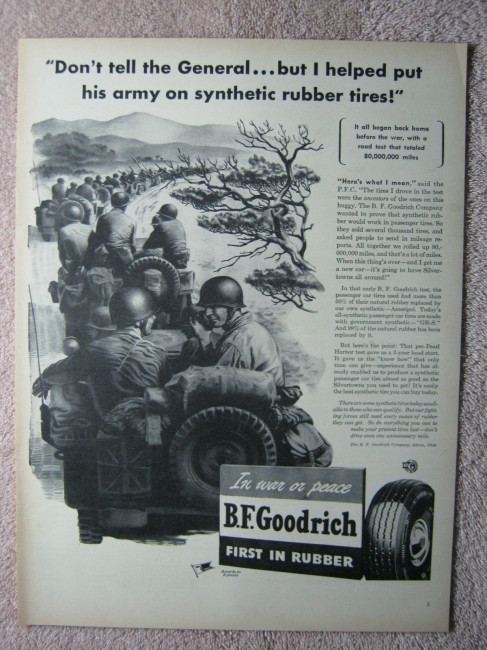I just noticed this vintage ad has the slogan “In War and Peace” on it. Well, my new T-shirts have the same slogan. More on them tomorrow when I unpack the finished shirts1
8 Comments on “1944 BF Goodrich Tire ad with Jeep Convoy on eBay”
Leave a Reply


Slogan is “In War or Peace”… or instead of and.
Does it make a difference?
I gotta get my glasses fixed .. lol. Close enough 🙂
Pascal,
Perhaps this is an example of the confusion of the English word “or” being an “exclusive or” or an “inclusive or”? Another fun word of the English language. Usually the context determines which meaning as the meanings can be quite different.
Exclusive would be “one or the other, BUT NOT both.” Such as you can travel to Europe by boat OR by plane, but you cannot travel to Europe by BOTH boat AND by plane (at least not the same trip). Pretty straight forward; we understand from context.
Inclusive would be “one or the other, OR both” Such as a gathering of G503 inviting all Willys or Ford jeep owners. We would understand that to mean all Willys owners and all Ford owners are invited (regardless of what else they own). So, if you owned BOTH a Willys and a Ford you would also be invited. Pretty straight forward, we understand from context.
The problem arises in the last example if you make an exclusive reading of the inclusive intent; in that case if you owned BOTH a Willys AND a Ford you would not be invited! Imagine how much fun the lawyers can have with this word. 🙂
Back to the ad: “In war or peace.”
I’d say this is meant to be inclusive; “In war or peace, or BOTH war and peace).”
If it were read exclusively, it would mean “In war or peace, BUT NOT both war and peace.” That is – it is not good in both war and peace. That would get the ad agent fired!
So, I think you are reading it as an “exclusive or”, but expecting it to be an “inclusive or” – hence your instinct to want to substitute “AND” for “OR.” And you would be correct about the inclusive part. Many other languages do not have this “or” problem and those learning English quite easily get tripped up by it (not meaning that to necessarily include you as I don’t know your background).
Wow! 😉 Thank you for this great explanation.
As for my background;
Normally I read a 500 page book in a week.
I’m reading Finding Virginia right now since the last two week. (Great book and thank you David for the dedication.) I was considering myself as very good in English but now I’m revising it to good. As an electrical technician, I have to read a lot of instruction documents in English and as web surfer, I visit a lot of English website. Like you said, there is a context. A book is different as a conversation or a website. I did not notice the real difference between the “or” and the “and” but now I understand it. Thank you.
…I’m french Canadian…I can’t be perfect!
P.S. I will explain to my wife tonight that she can have a headhache OR …
Pascal,
Strange how a word can mean almost two opposite things isn’t it?
I was willing to bet English may not have been your native language. Not because the question was “uneducated” but because you recognized an inconsistency and asked about it. Most of us English speakers probably would not have thought twice about it and maybe even read your question and said “Huh, what’s Pascal asking?” We are so used to the difference we don’t even notice it.
Conversationally, we usually use OR as an “exclusive or” and substitute AND for the “inclusive or” – just like you did. As a language, English is probably trending away from using the “inclusive or” conversationally.
In probability, logic, etc. OR is used as an “inclusive or.”
In French do you have two different words for the “inclusive or” and the “exclusive or’?
Pascal,
I should add that I don’t know a bit of French, so I certainly am not being critical of your English. You are miles (kilometers 🙂 ) ahead of me in knowing a second language. I just hope I can help explain this language we use down here.
DanB
I really enjoyed reading all these comments, I never know where I’ll end up when visiting ewillys but it’s always interesting. Pascal, let me know how that wife explanation works out, ok? Thanks again!
Hummm….She did’nt want to understand OR she just did’nt want at all.
I think that make it an inclusive or!